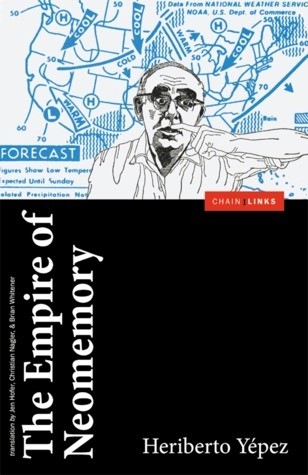'Il Gruppo' Surfaces to Respond to Heriberto Yépez's Complicated Book on Charles Olson's Time in Mexico

There's an interesting back-and-forth going on at Jacket2 at the moment regarding Heriberto Yépez's ChainLinks book, The Empire of Neomemory, published in Spanish in 2007 and recently translated by by Jen Hofer, Christian Nagler, and Brian Whitener for this edition. Yépez--called "one of the best writers and chroniclers of contemporary Mexico and one of the two most important literary minds writing in Mexico right now"--set out originally to investigate Charles Olson's time in Mexico, but eventually wrote of his project: "Olson in and of himself does not interest me; I am interested in his character as a microanalogy for decoding the psychopoetics of Empire."
In the spring, Jerome Rothenberg posted excerpts from the book on his Jacket2 Commentary page, which drew attention from a member of Il Gruppo, Benjamin Hollander, who now responds to Yépez's suggestion (as Hollander puts it) that "Olson and his poetry and prose reflect the impulses of a totalitarian and imperialist servant of empire." Hollander writes: "But now, inexplicably, fantastically, [Olson] has been morphed into the imperialist emissary of empire. Why has this happened?" More:
Members of Il Gruppo (Amiri Baraka, Jack Hirschman, Ammiel Alcalay, Carlos b. Carlos Suarès, Benjamin Hollander, and others) intend to respond in a place and form where such a debate — usually sublimated into one or another mode of theoretical double-speak, political correctness, or “fair and balanced” flattening of positions — might actually be forced out into the open. We will point to commentaries diametrically opposed to Yépez’s claims about Olson. For example, we would point to Diane di Prima’s lecture on Olson in which she recalls asking Olson
“When did America go bad? Was it after Jefferson? Was it late as Andrew Jackson and the stuff with a national bank?” Charles answered me instantly. Conspiratorially. Leaning close to my ear, he half-whispered in that gruff voice he used when he particularly wanted to underscore what he was saying: Rotten from the very beginning. Constitution written by a bunch of gangsters to exploit a continent.
Or we would point to comments by Olson’s Japanese translator, Yorio Hirano, who writes that Olson’s
Maximus Poems is a book of quest. Maximus, who wishes to find innocence in the beginning of America, finds the fact that the beginning has already been contaminated by the filth of commercialism and nascent capitalism brought there by Pilgrim Fathers.
As with any response to a revisionist historian’s subject, it is not so much the subject — in this case, Olson — which needs to be defended: his poetry and the facts of his life will do just fine in speaking for themselves. This is why it is difficult for Il Gruppo to buy into defending Olson as if we were presenting just another perspective in order to have a fair and balanced counter to Yépez’s so-called history. This move would mock the facts of Olson’s life. Are astronomers in the name of “fairness and balance” asked to present “the other side” to those who believe the moon is made of green cheese?
Rather, Il Gruppo intends to directly address Yépez’s claims, most importantly why they are being made, why and by whom they are seriously being entertained, their purported basis, and how they fall into a pattern of attacks on Olson. The space and form where such issues will be forced into the open is still under discussion.
We're looking for more information on Il Gruppo in general, and are keen to see them really wrestle with this work and literary history. Rumors circulate that they're looking to publish a small book on the matter. We'll keep you posted.


